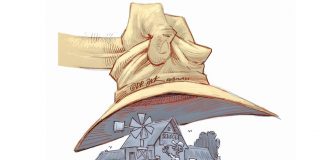Despite South Africa’s enormous agricultural potential, the country lacks a focused food and agricultural policy. Even the National Development Plan does not address food security comprehensively. Only adjustments to school and university curriculums and national debate about food issues will create a better understanding among urban communities about where their food comes from. Such a debate will also benefit the many government departments in South Africa dealing with aspects that affect agricultural production.
Africa was the only continent to show a decrease in food availability per capita between 1960 and 2012. It is believed that by 2050, sub-Saharan Africa (SSA) will produce only 13% of its food needs. This can be ascribed to a complex set of circumstances, including problematic climatic conditions, a lack of infrastructure, insufficient agricultural research, deforestation, overgrazing, and a wide variety of crops. In Africa, there cannot be an approach of ‘one solution fits all’, but best practices can be implemented to address current challenges.
A current lack of proper policies is another reason why Africa could face severe food shortages by 2050. And it is why Africa suffers from a smallholder tragedy. Many farmers on the continent are isolated, fragmented and not organised; they are unable to negotiate better prices when purchasing production inputs and sell agricultural produce.
Successes
However, three African countries have succeeded in recent times in improving their crop yield substantially. Cacao producers in Ghana, cotton producers in Burkina Faso and farmers in general in Ethiopia are setting a fine example of how smallholders can become better organised. In the same way, smallholder operations across SSA, including in South Africa, should be helped to grow and work under an umbrella structure.
They need to increase to an appropriate scale, depending on climatic conditions and the food they produce, to be proud farmers. Modernisation does not always mean large-scale production. Unfortunately, worrying questions arise about the dwindling number of commercial farmers in South Africa and whether their sons and daughters indeed show enough interest to become their successors.
Opportunities
A much more substantial increase in food production is needed to ensure that the rapidly growing world population will be properly fed by 2050. Nearly all population growth will take place in Africa and the continent will not escape increasing urbanisation, or the pressure of people advancing to the middle income group and expecting more sophisticated food options.
There are several possible solutions and opportunities:
- A doubling of investment in public agricultural research in SSA would increase growth in agricultural output from 0,5% to 1,1% and reduce poverty by 282 million people.
- Agriculture under irrigation, which currently comprises only 4% of production in SSA, should be increased.
- GMO technology should be used where there are no other alternatives to overcome severe production problems.
South African producers and researchers should also take cognisance of the fact that the population in certain countries is ageing. Apart from supplying food in bulk for mass markets, South Africa could produce specialised food types. These include food for the elderly (which is easily digested or contains an extra dose of vitamins), or food for consumers with certain diseases or conditions such as cancer or Alzheimer’s.
Some countries are already producing food that fall into a category between conventional food and pharmaceutical products, such as specially selected oranges that contain a higher potassium level or fruit that contains more vitamin C. There are enough reasons to be optimistic about solving problems with regard to food security, but we have to open up the debate so that it is based on empirical, scientific findings rather than on idealistic wishful thinking.
Prof Fresco addressed the ARC in Pretoria. For more information, phone Renate Venier, national liaison officer, Academy of Science of South Africa, on 012 349 6633.
The views expressed in our weekly opinion piece do not necessarily reflect those of Farmer’s Weekly.













